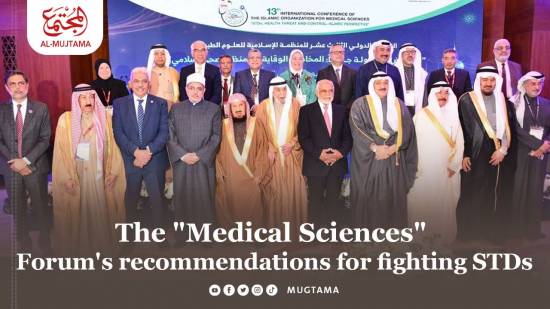The "Medical Sciences" Forum's recommendations for fighting STDs Featured
The 13th International Forum of the Islamic Organization for Medical Sciences, which was held in Kuwait, titled “A Renewed Epidemic… Sexually Transmitted Diseases: Risks and Prevention from an Islamic Health Perspective,” with the participation of specialists and experts from 20 Arab, Islamic and European countries, came out with 12 recommendations included in the Kuwait document to combat “Sexually Transmitted Diseases”, at the conclusion of the forum, yesterday, Tuesday.
The conference came out with 12 recommendations, which we summarize here as follows:
First: International and political commitment to combating these diseases and putting sexual health on the list of priorities of presidents and ministries of health, especially in the countries of the Organization of Islamic Cooperation, and establishing a health, jurisprudential and media coalition to combat sexual diseases in cooperation with specialized and interested organizations, bodies and institutions.
Second: Calling on the World Health Organization to expand prevention efforts, recognizing the importance of the role and impact of places of worship, especially in developing Islamic countries, and expanding the scope of health interventions, such as hepatitis B and human papillomavirus (HPV) vaccines, as well as screenings for syphilis and HPV in groups priority population.
Third: With regard to the legal axis; Taking care of updating legal legislation that deters the promotion of homosexuality and forbidden relationships in the media and social media, and spreading the legal culture related to combating homosexuality and those who promote it and those who call for immorality and immorality.
Fourth: Civil organizations intensify their role in raising awareness in the field of sexual health and developing qualified cadres to work to confront this phenomenon, and focus on calling for avoiding social networking sites that promote perversion in order to clamp down on it while encouraging, highlighting and publishing communication sites that urge virtue.
Fifth: Regarding treatment; Efficiently integrating the fight against sexual diseases in primary health care centres, and enhancing the patient's right to obtain treatment in accordance with medical principles. As well as supporting and supporting the mentally ill, facilitating treatment matters for them, while not stigmatizing them with what is offensive, and following up on the latest diagnostic methods and their obstacles.
Sixth: Enhancing the important role of clerics in consolidating the religious faith for prevention, through coordination with the Ministries of Awqaf and Islamic Affairs and those who replace them in the countries of the Western world, to raise awareness of the dangers of these diseases and their consequences in this world and the hereafter, and to develop health education skills for preachers about these diseases.
Seventh: Spreading awareness of prevention methods; By avoiding sexual anomalies and perversions, which are the most important risk factors for contracting sexually transmitted diseases, and using safe and highly effective vaccines in preventing sexually transmitted infections such as hepatitis B and human papillomavirus, paying attention to male circumcision; for its importance in prevention.
Eighth: Confronting the challenges facing Muslim minorities, by conducting societal scientific studies of the challenges and risk factors facing Islamic countries and Muslim minorities in facing sexual diseases, and supporting and educating young people and strengthening the relationship between families within Muslim minorities.
Ninth: Paying attention to digital health, by intensifying the use of means of communication in education and clarifying health risks and legal controls.
Tenth: Activating the role of the media. Increasing the capabilities of specialists in raising awareness in universities and schools, through television and radio, and disseminating it as widely as possible through social media. Opening a direct media dialogue with young people to answer their inquiries and what is going on in their minds in order to narrow the scope for spreading vices. Encouraging and publishing dramas that fight against vices and call for virtues, and manufacture them, if possible. Warning of the drama that calls for vice. Educating those about to get married about sexual rights, duties, and prohibitions, and urging them to perform the required medical tests to ensure that they are free of sexually transmitted diseases.
Eleventh: Raising awareness of the rights and duties of patients, with the aim of preventing the spread of sexually transmitted infections, and avoiding health teams stigmatizing patients with offensive descriptions.
Twelfth: Encouraging scientific research and keeping abreast of rapid scientific developments, by updating curricula in schools and universities with attractive scientific materials on the dangers of sexual diseases and methods of prevention. Training and educating university and school youth regarding the prevention of these diseases.
At the end of the forum, the participants raised their thanks and appreciation to His Highness, the Kuwaiti Crown Prince, Sheikh Mishaal Al-Ahmad Al-Jaber Al-Sabah, for sponsoring the conference, and to the Kuwaiti Minister of Health, Dr. Ahmed Al-Awadi, for inaugurating the activities of the forum.


